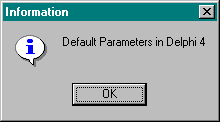| Delphi Clinic | C++Builder Gate | Training & Consultancy | Delphi Notes Weblog | Dr.Bob's Webshop |
| Delphi Clinic | C++Builder Gate | Training & Consultancy | Delphi Notes Weblog | Dr.Bob's Webshop |
|
Borland Delphi 4 features a number of Object Pascal language enhancements, as usual. In this article, I'll address a very special language enhancement that was originally only found in C++ development environments, namely Default Parameters.
Default Parameters
Default parameters is a feature that can also be found in C++ development environments (such as Borland C++Builder), and actually, it was already added to the Pascal compiler of Borland C++Builder 3 (see Borland C++Builder. 3 Developer's Guide page 7-17).
The feature means that we can provide default argument values for parameters of procedures and functions, and can omit an actual argument in case we want to use this particular default value.
Default parameters can only appear at the end of the function or procedure parameter list, and if we omit passing arguments, they start to count (and get replaced) from right-to-left.
As an example, let's consider the existing MessageDlg function:
function MessageDlg(const Msg: string; DlgType: TMsgDlgType;
Buttons: TMsgDlgButtons; HelpCtx: Longint): Integer;
Usually (like 9 out of 10 times), I use the MessageDlg in a fixed way: as an "information" dialog, with a certain Msg string, only an OK button, and no HelpCtx (passing 0).
However, I always have to pass all four arguments anyway, which often makes me feel I'm coding far too much (or should be doing things easier anyway).
program Delphi4;
uses
Dialogs;
function MessageDlg(const Msg: String;
DlgType: TMsgDlgType = mtInformation;
Buttons: TMsgDlgButtons = [mbOK];
HelpCtx: LongInt = 0): Integer;
begin
Result := Dialogs.MessageDlg(Msg, DlgType, Buttons, HelpCtx)
end;
begin
MessageDlg('Default Parameters in Delphi 4')
end.

Note that I can still include values for the three default parameters: they will be filled from left-to-right (and hence omitted from right-to-left, as I stated earlier).
So, for a YesNo confirmation dialog, without a specified HelpCtx value, I could simply call the following:
MessageDlg('More New Language Features in Delphi 4?', mtConfirmation, [mbYesNo])
Default parameters are a great way for programmers to write less (and probably much clearer) code.
Default arguments in declarations should be used to denote - indeed - default values and default behaviour, where we don't even need to specify the actual values.
Overloading and default parameters
When using both method overloading and default parameters, don't introduce ambiguous method signatures.
These are considered errors by the compiler.
For example, your application can't include two declarations such as the following:
procedure Answer(I: Integer; J: Integer = 0); overload; procedure Answer(Size: Integer); overload;
This is illegal because it is impossible to tell which procedure is meant by a call to:
Answer(42);